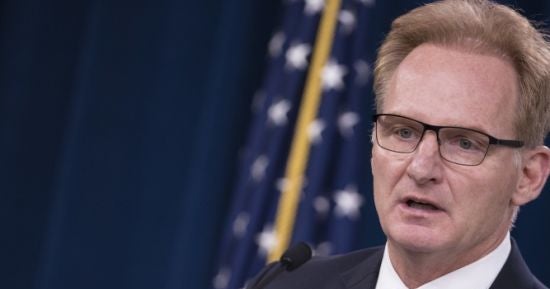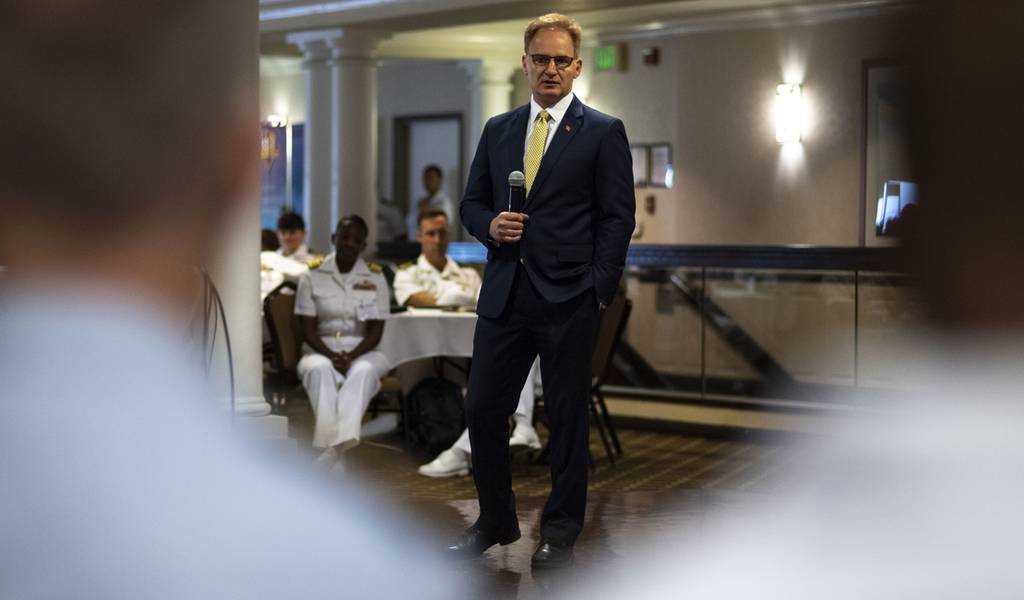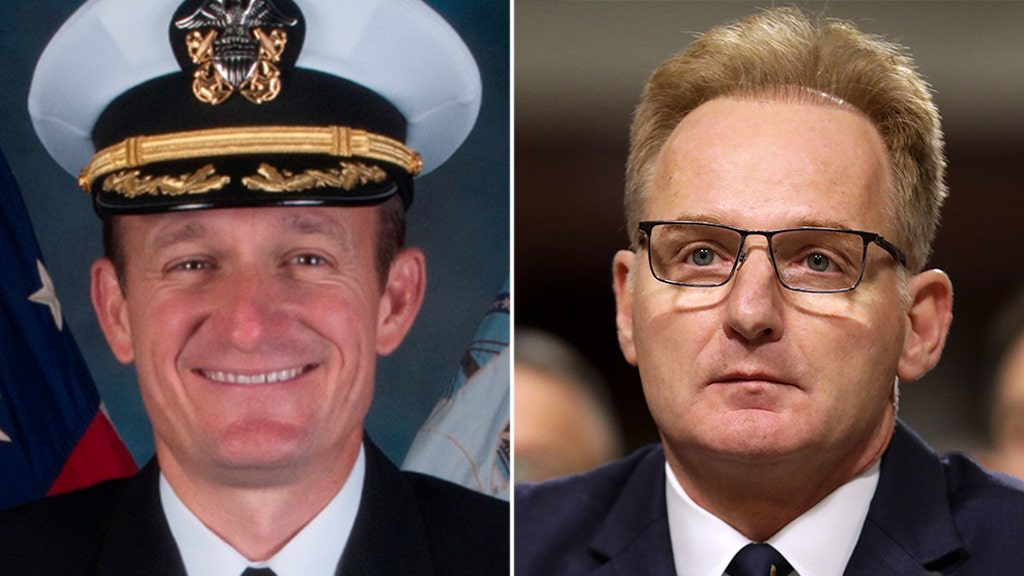- Joined
- May 30, 2010
- Messages
- 1,651
- Reaction score
- 1,607
Disgraced Former Acting Secretary of the Navy Thomas Modly
If you don’t have a WSJ subscription.

Acting Navy Secretary Modly resigns
Acting Secretary of the Navy Thomas Modly resigned on Tuesday after berating thousands of sailors in Guam and later doubling down on his remarks.taskandpurpose.com

So now what does the post-Modly Navy do with Crozier, assuming he isn’t in any hurry to retire and prefers to stay for 30 (in 2022)? What is going through N-1’s mind right now in charming Millington?
Cozier was unfit for duty. He deserved to lose his position.
Cozier [sic] was unfit for duty.
Seemingly the only people who support Modly are pathological supporters of Trump or super-salty military vets who think that the military has gone soft.
Im a conservative and I’ve already gotten into arguments with family on the topic. Cozier was unfit for duty. He deserved to lose his position. But absolutely other heads should roll. Glad SECNAV is out, what an embarrassment. How about further crushing morale of an already demoralized crew dealing with an on ship epidemic. What a tool
The (now-former) ASECDEF certainly could have handled things better, or at least with more tact. His resignation itself is evidence that even he agrees he erred. All that said, I don't see any concrete reasons to believe he was untruthful about his reasons for relieving Capt Crozier, as detailed in the earlier memo.
If his account is to be taken at face value, it appears that Capt Crozier actually did not first avail himself of options short of a nuclear memo to dozens of people. Why didn't he limit the email distribution to the handful of people in his chain of command? People in this thread have guessed that maybe he had already spoken with them, or "knew" that they would not take his concerns seriously. True or not, you don't get to skip the formal consultation with superiors just because you fear you won't like the answer you think they'll give.
The media keeps bringing up how much his crew loved him, and that's nice. Desirable. But a commander being liked isn't a goal in and of itself, or even a mitigating factor for other lapses. Good leaders are usually but not always popular; popular ones can certainly be poor leaders. The standing ovation he got as he left the ship is neither here nor there. (Except perhaps as an alarming demonstration of not-social-distancing in the midst of a pandemic.)
I remain un-outraged by Capt Crozier's relief.
On a related topic, I'd like to hear more discussion about the decision to go ahead with the March 5th port call in Vietnam. Thus far, the information put forth was that the risk was believed to be negligible. This is very different than a more understandable scenario: assessing the risk as substantial but balancing that risk against important strategic benefits and going ahead with the port call with eyes wide open. One way or another, there's another error here worth considering.
Commercial cruise ships were canceling port calls in Vietnam a month earlier. Why we assessed the same risk differently deserves some scrutiny.
That decision was defended (in his public statements) by then-acting Secretary Modly, so the decision to proceed with the port call can be presumed to have been made at or above his level.. . .
On a related topic, I'd like to hear more discussion about the decision to go ahead with the March 5th port call in Vietnam. Thus far, the information put forth was that the risk was believed to be negligible. This is very different than a more understandable scenario: assessing the risk as substantial but balancing that risk against important strategic benefits and going ahead with the port call with eyes wide open. One way or another, there's another error here worth considering.
Commercial cruise ships were canceling port calls in Vietnam a month earlier. Why we assessed the same risk differently deserves some scrutiny.
I don't agree. Not at all.
Crozier had an impossible choice: continue with the deployment and deal with an uncontainable contagion and risk a medical disaster, and go against CDC and NAVADMIN instructions or go around an obviously dysfunctional senior chain of command and pressure the dysfunctional links of that chain to give way to stopping the deployment and disembarking the crew for medical isolation and quarantine. The chain of command failed him. RADM Stuart Baker failed him, ADM Davidson failed him, as did ADM Michael Gilday and ADM John Acquilino and of course the most craven and erratic-acting Secretary of the Navy now departed station. The senior line chose not doing anything that might aggravate the vanity of President Trump over the safety of the crew of the Theodore Roosevelt. That is the shame and disgrace of it. The argument that somehow some weakness of the force was revealed is just ludicrous. No naval vessel afloat, of allies or adversaries, save an unmanned drone, has the capacity to contain a highly contagious pneumonically-spread epidemic. No vessel of any navy anywhere. All that was demonstrated was that when fast, decisive decisions to do the correct measures were needed, the politically-cowed senior leadership of the U.S. Navy could not deliver. That was the wrong thing.
Agreed; I wasn't implying fault with any one person for the port visit. Canceling a port call by the first major US warship to make one in Vietnam in 40 years isn't like canceling dinner reservations because you're not that hungry.That decision was defended (in his public statements) by then-acting Secretary Modly, so the decision to proceed with the port call can be presumed to have been made at or above his level.
The fact of contagion in the port was known to commercial interests well before, and was no secret. Whether the risk as-known was discounted or not but taken regardless in the interest of other objectives is something for an investigation. Whether one will occur at the level of the Secretariat is doubtful (I can't believe the DOD IG would initiate one without Esper signing off which would be politically-fraught) unless Congress forces the issue. That probably won't happen unless there are significant casualties resulting among the crew of Theodore Roosevelt, in the event that has yet to fully unfold.
What I meant was that while it's possible for us to discuss and weigh the COVID-19 risk associated with the port call, we'll probably never have any insight into the things on the other side of the equation - the political, diplomatic, strategic benefits to doing it. Maybe it's not even fair to call it an error. Not every GO decision with risk is an error if the risk shows up.@pgg it is useful from a lessons-learned perspective. Did they consider the risk? What information did they have? What can we learn from that error to decrease the chances of a repeat in the fall when COVID is “gone”?
Don’t think that because I said the chain of command in this incident wasn’t effective—it was badly defective in many ways—that I believe that chain of command is unimportant. You have a duty nonetheless if you suspect the chain is not responding to important information to persuade or failing that, to warn of consequences. In the long- knives world of major command, that comes with a price, which CAPT Crozier surely knew and paid.You’re a senior member and you don’t understand the concept of chain of command? That’s troubling
Don’t think that because I said the chain of command in this incident wasn’t effective—it was badly defective in many ways—that I do not believe that chain of command is unimportant. But you have a duty nonetheless if you suspect the chain is not responding to important information to persuade or failing that, to warn of consequences. In the long- knives world of major command, that comes with a price, which CAPT Crozier surely knew and paid.

The A-SECNAV subverted the COC and admitted to as much, to the extent of having his staff give the CO his cell number. That is the tell that he didn’t have much confidence in the effectiveness of the chain either.There is a chain of command. If your immediate chain of command is unresponsive, you go up your chain of command. You don’t send a blast email out to over 20 people, compromising security and your mission. He lost his job at that moment. It was inexcusable. If his immediate chain of command was making a poor decision and compromising the health of our sailors, he also stands accountable. But that does not change the fact that Cozier failed. The SECNAV didn’t lose his job because what he said was inaccurate...he lost his job (or resigned if you want to call it that) because he was a dickhead about it.
The A-SECNAV subverted the COC and admitted to as much, to the extent of having his staff give the CO his cell number. That is the tell that he didn’t have much confidence in the effectiveness of the chain either.
Again irrelevant. If your immediate COC is dysfunctional, you still stick to protocol. You work your wayup the chain. You don’t do what he did. I don’t see how this is a surprise or debated.
What do you think would have happened to CAPT Crozier if he had stayed within the chain of command and, as a result of the delay, they lost a sailor to sudden respiratory or cardiac failure while underway?
Again irrelevant. If your immediate COC is dysfunctional, you still stick to protocol. You work your wayup the chain. You don’t do what he did. I don’t see how this is a surprise or debated.
I’m sure that Coziers immediate chain is currently under fire. If his chain was AWOL or essentially told Cozier to deal with it we’ll see more heads roll. But it’s not going to change Coziers fate.
Just follow orders no matter the consequences huh...
I am having flashbacks to My Lai. I think Crozier was truly caught in a no-win situation.
What do you think would have happened to CAPT Crozier if he had stayed within the chain of command and, as a result of the delay, they lost a sailor to sudden respiratory or cardiac failure while underway?
. . .
Based on the facts we have, Crozier frantically broke chain of command.
And frankly, saying that we aren’t at war? That’s insulting. We are at war. We’ve been at war for going on two decades. I don’t think that we should have men in charge of aircraft carriers that don’t think that we are at war. That’s complacency.
There is no evidence that he did anything "frantically." He was dealing with the contagion issue from Vietnam. His letter /appeal/email was a well-drafted and well-referenced document. His inside channel communications that preceded it are not in the public domain, at least yet. We have only statements made to reporters by other elements of the Pacific Navy COC, among them RADM Baker.
We are not at war in the Pacific, with China or any other nation there. And in fact, we are not at war anywhere. Our intelligence and special operations activities in the middle east and Afghanistan are somewhere in-between peace and war. (But of course, none of those are in the Pacific.) Really, you would have to be divorced from reality, or be seriously deficient in reality testing to believe differently. Just because the White House Press Office and the President use a war-like rhetoric, or refers to our present (metaphorically, although he probably couldn't tell you the difference) crisis as a "war," or absurdly styles himself as a "wartime president" doesn't make this a war nor does it make routine naval deployments warfare. Words do have meaning, and those meanings are important.
yeah if we can’t even reach an argue to the point that we are at war...there really is no need wasting either of our time.
Where are we at war in the Pacific? We are at economic and political war with China. Where is the evidence that we are in combat with any nation in the Pacific? Is it too much to ask for you to explain your argument that we are at war in the Pacific? I'd like to understand your perspective. Thanks.
Do you not think cold war is war?
I didn't make any assumptions. I didn't make a statement. I asked you to answer a question, to the best of your ability, based on your knowledge of and experience with the military.It’s just amazing to see the about of inside knowledge there is on the subject. The amount of assumptions that are being made by the protectors of this man is making me dizzy.
The Cold War was a historical period. It was, as the term itself implies, not a "shooting war," which during that period carried the fearful connotation of nuclear exchange. It's main feature was a period of strong diplomatic tension, relaxed occasionally and also punctuated by combat in proxy wars. The Berlin Crisis, the Korean Conflict, the suppression of the Hungarian Revolution in 1956, the Cuban Missile Crisis, the Vietnam War, the Soviet invasion of Czechoslovakia in 1968, proxy wars in Africa, all military conflicts of the period. With that came the undercurrent of intelligence activities by all principal parties, many of which were violent. But was it a war itself? No.Do you not think cold war is war?
 news.google.com
news.google.com
The only things that we do know are the details of the email, that Crozier went outside of his COC, and that the SECNAV is a jack hole.
A TR sailor was just admitted to the ICU

Sailor from USS Teddy Roosevelt found unconscious, transferred to intensive care
A sailor from the USS Theodore Roosevelt who had tested positive for coronavirus was admitted to an intensive care unit in Guam Thursday after being found unresponsive, according to a Navy official. The impact of the coronavirus pandemic on Teddy Roosevelt sailors was at the center of a...news.google.com
Admitted to ICU 4/9/20. Tested positive 10 days ago.[had erroneous information, appears the article was updated from when I first read]
Sent from my iPhone using SDN
